Christ is risen!
Students, we are now going to play a sort of Third Grade game, but with a serious purpose. So pay attention, and please do what I say.
Now: Look around – forward, left, right, up, down – and take in and remember what you see.
Next, close your eyes (wait, not yet!) and with your eyes shut do the same: look around – forward, left, right, up, down, and take in what you see, then open them again. Ready? NOW!
____________________
You’re back. Good! (At my age if I closed my eyes for even that long, I’d be asleep and you’d have to write the rest of this Post yourself.)
So, what did you see the second time? List your answers in this box: []
OK, we’re done with our little game.
What’s this all about? To illustrate the fact that we can see the material world, but we are  blind to another world which exists all around us. According to the Scriptures and the Church, we are surrounded by a multitude of presences, just as numerous as the people around us (in normal times, that is). Your guardian angel is here beside you now, and sometimes other angels. You might see saints from time to time. And almost certainly you would see a demon or two lurking nearby. We can sense their presence as they tempt us, but we cannot see them. The Unseen World.
blind to another world which exists all around us. According to the Scriptures and the Church, we are surrounded by a multitude of presences, just as numerous as the people around us (in normal times, that is). Your guardian angel is here beside you now, and sometimes other angels. You might see saints from time to time. And almost certainly you would see a demon or two lurking nearby. We can sense their presence as they tempt us, but we cannot see them. The Unseen World.
Occasionally people get a quick glimpse into that other world. (If you have, and want to share the story, please comment below.) But be very careful here. Remember that Satan also can produce dreams and imaginations and visions and even visible presences, designed to mislead us or terrify us. 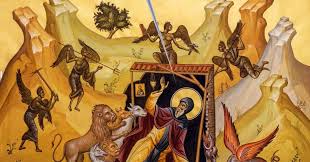 Saint Antony the Great in the desert left suffered many of these. Once he saw a glorious “being” who claimed to be Jesus Christ. It wasn’t.
Saint Antony the Great in the desert left suffered many of these. Once he saw a glorious “being” who claimed to be Jesus Christ. It wasn’t.
You can see where we’re going with this. Our Gospel reading this next Sunday is the story of the Man Born Blind. Who is the Man Born Blind? You are. I am. We all are. The Apostle John saw in the Man Born Blind a symbol of our spiritual blindness, and of the cure. Like him we are in great danger. Walk around blindfolded and you’re likely to fall on your face. “When is it night, when is it day? My feet cannot endure striking against the stones. For I have neither seen the sun shining nor beheld the image of Him who fashioned me.” (Sticheron at Vespers of the Sunday of the Man Born Blind) Walk in darkness without a guide, and you might even step off the edge of a cliff.
We need someone to give us light in this darkness, to restore our spiritual sight. Or rather Someone. He who declared “I am the Light of the World”. He who will not fail us: “The Light shines in the darkness, and the darkness has not overcome it.” John 1:5 Without Him the best we can do is to go tap-tap-tapping through life, hoping against hope that we can get to the end of the jouirney safely. Chances are not good.
Before we proceed, keep in mind that we use the world “see” in several ways. 1) Optical vision. 2) Symbolic vision: When Christ says He is the Light, He means that He guides us. 3) Super-sensual vision, such as we will have after we die and have left our eyes behind. 4) There is also another kind of Light which has sometimes been seen – with physical eyes? or in some other way? ? An actual Light of God, God the Father who  “dwells in inaccessible Light”, but Christ manifested that Light on earth at in His Transfiguration. So have some saints: Saint Seraphim of Sarov, walking with his disciple at night, his face brilliant with light, illuminating the falling snowflakes. Some who use the Jesus Prayer have seen this “Uncreated Light”. And more.
“dwells in inaccessible Light”, but Christ manifested that Light on earth at in His Transfiguration. So have some saints: Saint Seraphim of Sarov, walking with his disciple at night, his face brilliant with light, illuminating the falling snowflakes. Some who use the Jesus Prayer have seen this “Uncreated Light”. And more.
Are we all confused now? Usually, we easily go back and forth between these kinds of “light” without defining them, but knowing what we’re talking about. Maybe I should never have brought it up?
The Man Born Blind
Text: John 9:1-38
Jesus and His disciples came upon a man who had been blind from birth. 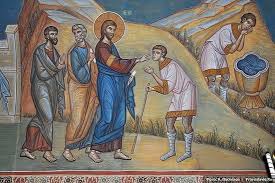 His disciples asked: “Master, who sinned, this man or his parents, that he was born blind?” To the Jews the answer was obvious: such debility was the result of personal sin. Jesus did not teach that. (See, for example, Luke 13:4.) To the larger question, there was another obvious answer: Adam and Eve, the parents of us all. When Mankind fell away from God we lost our spiritual sight. But surprisingly Jesus gave neither of these answers. Instead He said, “Neither this man nor his parents sinned, but rather that the works of God might be made manifest in him.” What ever did He mean by that? that the whole fallen condition of mankind exists, so that God can save us? (I don’t understand his answer. If you do, please Comment.) He concluded “As long as I am in the world, I am the Light of the world.”
His disciples asked: “Master, who sinned, this man or his parents, that he was born blind?” To the Jews the answer was obvious: such debility was the result of personal sin. Jesus did not teach that. (See, for example, Luke 13:4.) To the larger question, there was another obvious answer: Adam and Eve, the parents of us all. When Mankind fell away from God we lost our spiritual sight. But surprisingly Jesus gave neither of these answers. Instead He said, “Neither this man nor his parents sinned, but rather that the works of God might be made manifest in him.” What ever did He mean by that? that the whole fallen condition of mankind exists, so that God can save us? (I don’t understand his answer. If you do, please Comment.) He concluded “As long as I am in the world, I am the Light of the world.”
Jesus gave the man his sight in a very odd way. He spat on the ground, made clay, anointed the man’s eyes, and told him to go wash in the pool of Siloam. The man came back seeing. It’s a symbol: Christ usually restores our spiritual sight, enlightens us, through material means. (But don’t limit Him. He is God. He can work any way He wants.) As follows:
Through the Water of Baptism. Did you know: In ancient times, Baptism was called “Enlightenment”.
Through the Bread and Wine of the Eucharist.
Through the Scriptures and other holy books, and through holy music – that is, words spoken or sung with out material mouths, and written or transcribed by material hands.
Through Holy Unction or other holy oils, for example myrrh flowing from weeping icons. (See Post 79.)
The Dialog begins
Now, all this created quite a stir. First among the neighbors, who refused to believe it. Now again, John shows his skills as a dramatist. It would be fun to turn this dialog into a short stage play. In what follows I paraphrase greatly to save space.
“This is the man born blind.” “No, it isn’t.” “Yes, it is.” “Yes, I am the man.” “Who did this?” “A man called Jesus.” “Where is He?” ” I don’t know.”
They took him to the Pharisees. Jesus had done this on the Sabbath, so here we go again: “How did he do it?” “He put clay on my eyes.” “He can’t be from God, because He broke the Sabbath.” “But how could a 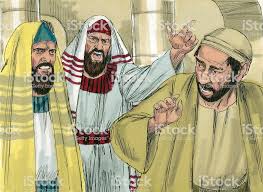 sinner heal someone like this?” To the Man Born Blind: “What do you say about Him?” “He is a prophet.” Let’s ask his parents. “Is this your son?” “Yes.” “How does he now see?” They, afraid to get involved: “We don’t know. Ask him.” To the Man Born Blind: “Give God the praise. We know this Man [Jesus] is a sinner.” “That I don’t know. All I know is once I was blind. Now I see.”
sinner heal someone like this?” To the Man Born Blind: “What do you say about Him?” “He is a prophet.” Let’s ask his parents. “Is this your son?” “Yes.” “How does he now see?” They, afraid to get involved: “We don’t know. Ask him.” To the Man Born Blind: “Give God the praise. We know this Man [Jesus] is a sinner.” “That I don’t know. All I know is once I was blind. Now I see.”
I know the hymn “Amazing Grace” is much overused, and it’s not from our Orthodox hymnody, but it fits so well here. The words were written not by a fundamentalist but, surprisingly, by an 18th century priest of the Church of England, a repentant slave holder whose eyes had been opened to the evil he had been doing. And also to a lot more.
Before we jump in, how do Orthodox understand Grace? “The Church Fathers teach that Grace is the very life that flows naturally and eternally from God. It is the real, life-bestowing power that brings us into communion with Him.” Fr Michael Shambour, 2015
First, a classic American folk version. Second, a concert version by Andrea Bocelli who (did you know?) is himself blind. Please pardon the commercials.
What? no female singers? I tried to attach a very lovely performance version by the group Celtic Women, but couldn’t do it. Go to https://www.youtube.com/watch?v=HsCp5LG_zNE I think it’s worth opening another window for this.
This also is worth watching: “Amazing Grace” used beautifully, I think, for pastoral purposes, to minister to grieving people of Emanuel African Methodist Episcopal Church in Charleston, South Carolina, after nine of their church members had been massacred. This was in 2015. This was President Obama. I am not using this for political purposes, so I’m advising you beforehand in case any of you would rather skip over it. We live in strange times. https://www.youtube.com/watch?v=IN05jVNBs64
Now… the drama of the Blind Man continues: “How did He do it?” The formerly Blind Man now is fed up: “I already told you. What? Do you want to become His disciples?” “We are Moses’ disciples. We know nothing about this man.” “Look. He opened my eyes. Everyone knows that God doesn’t listen to sinners. If He healed me, He must be of God.” “You were blind, born in sin. What can you teach us?” And they threw him out.
Now, how this applies to us
When Christ begins to move in our lives, when we first begin to “see” Him, it can cause not only joy and great change for us, but sometimes considerable consternation around us. It upsets “the system”. In the story, the Pharisees were greatly displeased, because they had everything all figured out. Their system did not allow people to see for themselves. Who are you to tell us anything?
But the formerly Blind Man was bemused by all this. For he was now 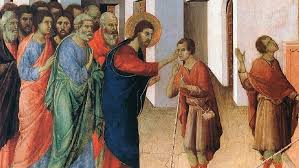 already seeing something with his inner eyes that the Pharisees, the authorities were not seeing. That always gets a person into trouble.
already seeing something with his inner eyes that the Pharisees, the authorities were not seeing. That always gets a person into trouble.
Today the conflict might be with the religious system: “What do you mean, you want to join that idol-worshiping sect?” Or with our secular system: Why don’t you want to get more stuff, a bigger TV, a larger house, or (dare I say it?) a bigger fancier church building? What’s this foolish talk about simplicity and spiritual riches? Or to take another case: When I was first moving towards Orthodoxy, I felt as if I walking into the Light. That’s the only way I could describe it. And then I indeed got kicked out..
Or with our parents or spouses: “You want to fast from what during Lent?” “Why are you going to church so much? You’re turning into a fanatic.” “How much do you want to give to that church?” or to charity? Even some Orthodox parents: “Why ever would want to be ordained?!” or “become a nun and waste your life?” People close to us may not understand.
When people think we’re gone weird, can we stand up to all this as the Blind Man did?
The Story continues.
Jesus heard about this, found the man, and asked: “Do you believe in the Son of Man?” * “Who is He, Sir, that I may see Him?” “You have seen Him. It is He who speaks to you.” He said, “Lord, I believe”, and he fell down befrore Him.
- a Messianic title. See Daniel 7.
After the Blind Man’s eyes were opened, he saw the one thing, the One Person finally worth seeing. A little while later, he came to see who He is. And that is His purpose with each of us: To open our inner eyes so that nobody will need to tell us about Him, but we will see Him for ourselves. 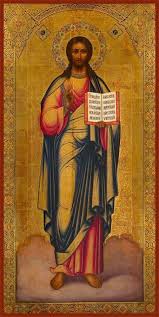 That begins the process by which we will see ever more of Him, for there is always more of Him to see. So that in the End finally we will be able to behold the One we already know, face to face: the glory of God in the face of Jesus Christ
That begins the process by which we will see ever more of Him, for there is always more of Him to see. So that in the End finally we will be able to behold the One we already know, face to face: the glory of God in the face of Jesus Christ
Immediately after today’s Gospel reading Jesus says “I have come…so that those who do not see may see, and so those who see may become blind.” The Pharisees, overhearing, ask “Do you think we are blind?” Jesus said, “If you were blind, you would not be guilty of sin; but now that you claim you can see, your guilt remains.” His answer is Yes, and it is evil to pretend to see when you do not, to claim you know God and His will when you do not. There has always been a lot of that in the world. You and I also need to be careful of that. I, especially, for Blogging can easily go to one’s head.

So here stand the Pharisees who think they have Life and Religion all figured out – but they don’t. True Life and true Religion consist of seeing the fair glory of the Lord, opening our eyes and entering into that Glory. True Life consists not about conforming ourselves blindly to the established order. (Conform when we can, of course. Don’t run around blithely disobeying your Bishop or civil law.) But obeying and behaving yourself won’t get you there. Life is intended to be a great journey, your great journey and mine, following Christ with eyes wide open, into the Mystery and Wonder and Beauty of the Kingdom of God.
Till finally, finally, finally at the End “We shall be like Him, for we shall see Him as He is.” 1 John 3:2
Next Week: The Ascension
Week after next: A full, complete and totally inadequate description of The Holy Trinity

Thank you so much for writing this blog. I’ve been reading it for about a year and I am really impressed with what you insert as illustrations. These different interpretations of amazing Grace were so inspiring. I can’t imagine how you pull them all together but I just wanted to say thank you!
The illustrations don’t take much time. I just Google “Man Blind From Birth Orthodox Icon” and select “Images”. A gazillion of them pop up, and I pick the first appropriate ones I like. Likewise I Google “Amazing Grace” and “Videos”. The problem: Whoops, there went an hour. I thought I didn’t like that song, but I do.